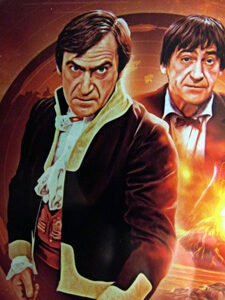The Enemy of the World
“Salamander talks to many people. Some only once.” – Fariah
A would-be world dictator rides a wave of populism into power by quelling people’s fear of hunger. (“Many people call him the shopkeeper of the world. The savior, in fact, some of them.”) Secretly he begins to solidify power as rivals are killed in ‘accidents’, replacing them with people loyal to him or under blackmail. He orchestrates ever-increasing natural disasters to his advantage, providing aid to victims and increasing his popularity. He’s set to become ruler of the world except for the few trying to fight against him and show the true man behind the mask. With all this, The Enemy of the World starts out strongly as an intriguing political thriller. I love the large scale of it initially–discussions of the Australasian zone, the orbiting Sun Catcher to insure Canadian crop yields, ten thousand robot harvesters along the Ukraine. The political machinations are best shown in Salamander’s casual manipulation of poor Federin into framing Denes. Meanwhile, the story is also a quasi-spy thriller with kick-ass Astrid Ferrier flying in on helicopter and Jamie and Victoria in a confidence game to infiltrate the bad guys.
The TARDIS crew are pulled into this web due to the fact that the Doctor is an exact double of this world leader Salamander. This story line allows for a masterful performance by Patrick Troughton that shows his strong acting ability: the Doctor, Salamander, the Doctor pretending to be Salamander, Salamander pretending to be the Doctor, even the Doctor and Salamander at the same time! This double act is one of the highlights of the story, especially in Salamader’s televised speech, the first cliff hanger, the reveal of the secret double-cross, and the final ending confrontation. As usual, the Doctor gets to make a lot of observations of disgust at humanity’s shortcomings: “They’re human beings….Indulging their favorite past time – trying to destroy each other” and “Sad really, isn’t it? People spend all their time making nice things, and other people come along and break them.” Yet the Doctor remains true to his principles even facing evil Salamander: “I’ll expose him, ruin him, have him arrested, but I won’t be his executioner. No one has that right.”
The plot takes a sudden and odd turn when Salamander disappears into deep tunnel where he is welcomed back by a band of underground ‘survivors’ of a supposed nuclear war. They have been hiding underground for five years and under his persuasive trickery have been creating natural disasters affecting the earth above in presumed retaliation. This bizarre twist only adds to our understanding of how manipulative and uncaring for individual lives Salamander is. The final twist of supposed rival Kent actually being in league with (and just as self-serving as) Salamander is even more unexpected and impressive. Only the Doctor is not surprised: “Any man who resorts to murder as eagerly and as rapidly as you must be suspect.”
Several other things impress in this once-lost-but-now-found story. Yet another huge location shot to start—a hallmark of almost every story this season of the show—in this case running all over a beach complete with chase by hovercraft. Almost every character is quite strong and stands out, even a bit comic one like grumpy old chef Grif. Most impressive are the strong-willed women who dominate the screen: Astrid who handily beats up even the most senior of guards and is steely in the face of near death and fiery Fariah whose seething, hidden hatred for Salamander is palpable to the end and speaks of much unacknowledged abuse. (“Sometimes we do what we have to do, not what we want to do.”)
Best (or worst) unsettling moments:
Poor Fariah is killed way too soon—I really hoped for her to get to see retribution. At least she gets to be fierce to the end: “You can’t threaten me now, Benik. I can only die once. And someone’s beaten you to it.” There is also a certain horror to the up-to-then unused idea of someone being sucked into the void of time. Seeing Salamander tumble from the TARDIS screaming into obvious oblivion is quite striking.
Firsts:
- View of the time vortex
Regrets:
There are a lot of plot holes to wonder about: Why would they send in Astrid who is an already known high level associate of Kent to deliver a secret message when she’s bound to be recognized (as she is)? Why do her own people on the beach suddenly turn so vicious in their pursuit to the point of trying to kill her? How has Salamander maintained a relationship with people both below and above ground without being suspiciously gone from one or the other place weeks or months at a time? [Maybe he hardly sleeps and spends nights down in the tunnel at what they think is day and vice versa?]
The bigger regret is how much of the enjoyment of the story is ruined by bad editing or events not even being shown but rather happening off camera. We barely see Danes being shot from behind but there is no death scene befitting the weight of his character’s death; in fact, we’re not really sure he’s dead until it’s mentioned later. Salamander attacking Swann is skipped all together. And the confrontation between the Doctor and Salamander, that should have been the capstone of it all, is relegated to the final minute of the show. While impressive in brief, it is way over-rushed and then the show is suddenly over with no real closure. It smacks of them having not planned well and run out of time.

